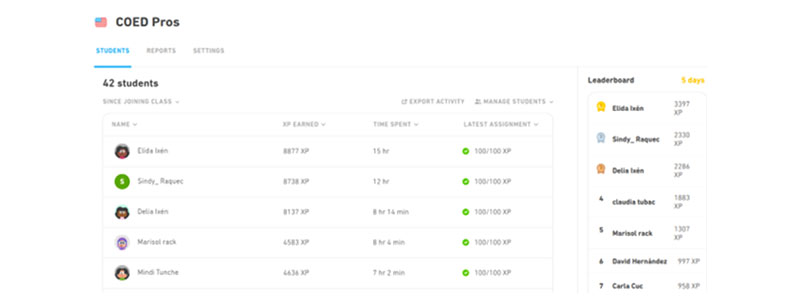English today is more than a subject in school—it is a passport to opportunity. In Latin America, learning the language can open doors to higher education, better jobs, and global networks. Yet despite its importance, traditional teaching methods often fall short. Learners lose motivation, classrooms feel disconnected from the workplace, and skill gaps remain.
The challenge is clear: how do we transform language learning into something engaging, inclusive, and practical?
The answer lies in a new equation: AI + Gamification + Human Guidance.
The Shift: From Repetition to Motivation
The old model was memorization: grammar drills, long lectures, and exams that measured recall but rarely built confidence. The new model uses streaks, challenges, and adaptive feedback. A blend between models can be powerful if you use the best of both.
Platforms like Duolingo already reach more than 80 million monthly users, turning practice into a daily habit by utilizing repetition and memorization. What makes the platform powerful is not just its design, but how educators and innovators can integrate it into structured training programs. When combined with artificial intelligence tools and human-centered facilitation, it becomes more than an app; it becomes a bridge between classrooms and careers.
Four Case Studies Across Generations
1. Thiago Ortiz, 11 years old
Thiago combines Duolingo with AI tools like ChatGPT and Gemini Canvas. The result? He speaks English, is learning Italian and Catalan, and even codes simple games. His project, Gamebrary, introduces peers to creative coding through AI. For him, learning is not a task; it’s an adventure.
2. Byron Cuc, 25 years old
From rural Guatemala, Byron struggled with English pronunciation. Through creative practice—rap, music, Duolingo, and six months of discipline—he landed a job in the BPO industry, rose to supervisor, and later became an English teacher. His journey shows how gamified learning fuels both skill development and career mobility.
3. Tania, Sofía, Ana, and Leonidas, 60+ years old
Armed with Duolingo streaks of over 1,000 days, these lifelong learners are living proof that neuroplasticity doesn’t retire. Their practice reduced shyness, helped them learn English and German, refreshed math skills, and even introduced them to AI as a personal tutor. Their message: it’s never too late to learn, and learning keeps the brain alive.
4. Teen Girls at COED (Cooperative for Education)
In a recent employability program we just started, co-hosted by Academia Impacto and DLS, 95% of the participants were teenage girls. Within just 10 days, dashboard data showed impressive growth. The secret was a simple formula: motivate, celebrate, challenge, and align with personal goals. The program is transforming abstract “education” into visible progress toward employability. A picture of their Duolingo dashboard with exciting real-time data below:

Industry Lessons We Cannot Ignore
-
The Human Factor is Critical: Technology supports, but humans inspire. Teachers, mentors, and even peers play a vital role in guiding learners to apply tools effectively.
-
Learning Must Serve Others: Knowledge multiplies when it’s shared. A learner who teaches, encourages, or mentors others not only grows personally but helps their community thrive.
-
We Must Reimagine Education: The 21st century demands more than content delivery. We must reengineer learning—integrating gamification, AI, and human values into every step.
Best Practices and Future Skills
These practices prepare learners not only with language, but with transferable skills like persistence, adaptability, and digital literacy—future skills employers already demand.
Conclusion: A Challenge to Readers
The path forward is not “machines replacing teachers” but algorithms empowering human creativity and compassion.
The challenge for all of us, educators, leaders, and learners, is to reimagine education as something practical, joyful, and purposeful. With consistency, willingness to self-learn, and above all, love for others, knowledge becomes a force that helps entire communities thrive.
 About the Author
About the Author
Marlon Alberto Paredes Palencia is an educator, researcher, and founder of Digital Learning Services (DLS) in Antigua Guatemala. He designs programs that integrate AI, gamification, and human-centered teaching to empower youth and professionals. Through collaborations with NGOs, businesses, and schools, he has helped hundreds of learners build skills for employability, leadership, and lifelong learning. Connect via LinkedIn or TikTok @Teachinggt/